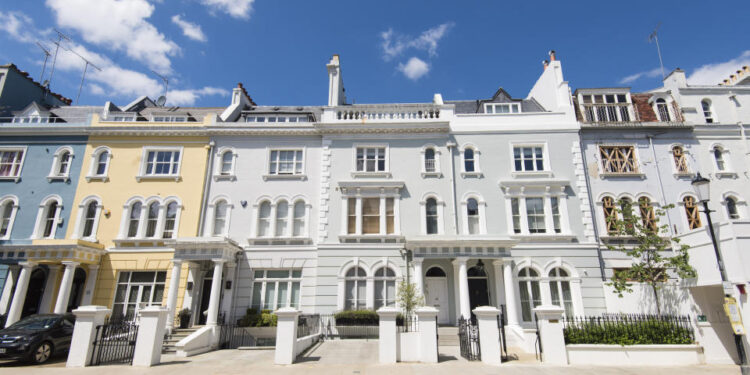[ad_1]
House prices continue to go through the roof as average asking prices in May have risen by more than £55,000 in the past two years to a record high of £367,501.
This fourth consecutive price record is not stopping enquiries, as the number of prospective buyers contacting estate agents in May was 31% higher than the more normal 2019 pre-pandemic market, according to property site Rightmove. The number of sales agreed was up by 12% in the year to date compared to 2019.
Prices are being driven up by a lack of supply, as the number of properties available to buy is 55% lower than the levels seen in 2019.
“People may be wondering why the housing market is seemingly running in the opposite direction to the wider economy at the moment,” Tim Bannister, Rightmove’s director of property science, said.
“What the data is showing us right now is that those who have the ability to do so are prioritising their home and moving, and the imbalance between supply and demand is supporting rising prices.
Read more: Inflation may trigger fall in UK house prices, says Nationwide
“Though demand is softening from the heady levels we saw this time last year, the number of buyers enquiring is still significantly higher than during the last ‘normal’ market of 2019, while the number of homes for them to choose from remains more constrained.”
However, Bannister warned that there are signs that the red-hot housing market may be cooling down.
“We anticipate that the effects of the increased cost of living and rising interest rates will filter through to the market later in the year, and a combination of more supply of homes and people weighing up what they can afford will help to moderate the market.”
The fourth successive interest rate rise by the Bank of England to rein in inflation has been costly for mortgage owners, who are now paying more than tenants.
In May, average monthly mortgage payments of £901 overtook the cost of rent, which stood at £887, according to Rightmove’s data.
The average monthly mortgage payment for a typical first-time-buyer home has increased by 13%, a jump of £100, since December last year following four interest rate rises, although this is only 11%, or £87, higher than 10 years ago.
Read more: House prices double around new Elizabeth Line stations
By contrast, equivalent monthly rental payments are 40% higher than 10 years ago, as tenants feel the full effect of rising costs. Rents are currently rising at the fastest pace that Rightmove has ever recorded.
“This new analysis shows how it has become increasingly difficult for an average first-time buyer to afford a home on their own. The historic average mortgage payments for a first home provide some good context to the current backdrop of rising interest rates and help explain why so many people take out fixed-rate mortgages,” Bannister said.
“As interest rates are predicted to rise further during the course of 2022, many buyers will be looking to lock in mortgage deals now before further rate rises. With so many variables affecting house prices and affordability, it’s a reminder that the market is extremely difficult to predict, and those looking to buy will be prioritising their own needs and what they can afford rather than waiting to try and time the market.”
For a person looking to buy on their own, on the national average full-time salary, borrowing 4.5 times their income, 10 years ago they would have needed to find a 25% deposit (£35,053) to afford a typical first-time buyer home. Today they would need a 34% deposit (£74,402).
At a national level it means that a person buying on their own on an average salary, looking to buy an average first-time buyer home, now needs a deposit 112% higher than a decade ago.
Read more: UK inflation is nearly 11% for poorest households, think tanks say
While average monthly payments for a first-time buyer on their mortgage have remained relatively stable over time due to low interest rates, the data shows that it has become more difficult to raise the increasingly large deposit needed to cover the gap between the price of a first home and what one can borrow.
Two people buying together on the average salary should still be able to afford a first-time buyer home if they have saved a 10% deposit, although that deposit size has increased from £14,269 to £22,312, a jump of 56%.
UK inflation soared to a more than 40-year high in April thanks in part to rising food, energy and fuel prices and the war in Ukraine as the economy deteriorates and people have less to spend.
According to the latest data from the Office for National Statistics (ONS), the consumer price index (CPI) measure of inflation rose to 9%, the highest since it started being calculated in 1997.
ONS estimates that CPI hasn’t been higher since 1982 when it peaked at nearly 11%.
Watch: Will UK house prices ever fall?
[ad_2]
Source link





